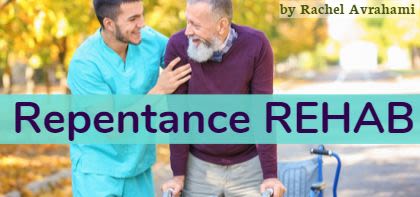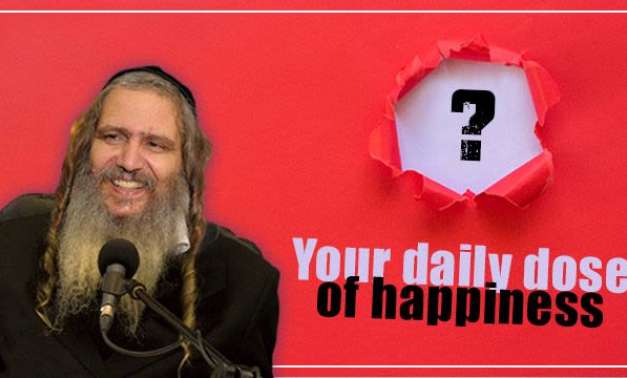
Repentance REHAB
I could not get myself to a proper daily accounting. I had to slowly rehabilitate myself after I realized that breast-beating was not teshuva and was totally wrong…

I admit it – for the longest time, I just could not do cheshbon nefesh (personal spiritual accounting) like Rabbi Arush says that you have to do every day. I wanted to! I really did.
But when push came to shove, I found myself unable. I would sit there without saying anything. I would try to get started, and get so upset at myself over the first usual topic that I just couldn’t continue. I hated myself for my inability to change, and found myself whining and complaining about my low spiritual level. Well, I know you’re not supposed to do that either, so back to silence I went. Sometimes I would fall asleep, or I would somehow just find myself wandering off to do something else…
The problem is that Rabbi Arush is really strong about how important a proper daily spiritual accounting is.
When you get to the Heavenly Court in the Next World, any day that had one full hour of personal prayer including cheshbon nefesh, the page that is that day just gets passed by. A day without? OK, time to get into every nitty gritty detail. It’s not pretty.
All the judgements on you are sweetened, because not only are you forgiven for ALL your sins (not only the ones you managed to talk about), but they are also turned into MERITS!
Don’t forget that Rabbi Arush says that you might be religious, and that’s well and good, but you’re only called a Yirat Shamayim – someone who fears Heaven – if you do a personal accounting of your deeds every day.
So, what to do. Failing miserably in this area was just not acceptable!
One day, I realized that I was missing an essential element – asking Hashem to help me to do a proper spiritual accounting. After all, Rabbi Arush says the best thing is to spend even 10 minutes asking Hashem to open your mouth and do your personal prayer properly, before even starting the hour!
I read the new booklet called Believe in Yourself – and learned that Hashem doesn’t ever give up on you. Even if you fall flat on your face and come back to repent on the exact same sin 1,000 times – G-d still takes you seriously every single time.
I listened to a Question and Answer session where a woman asked Rabbi Arush for advice, because every time she tries to do a spiritual accounting, she ends up so depressed that she can hardly get out of bed for three days. The answer was brilliant: “She isn’t doing a personal accounting at all! That’s just plain old self-blame and self-persecution. Teshuva is a mitzvah, and like every mitzvah, it has to be done with happiness!”
Say what?! Did you just use the words “repentance” and “happy” in the same sentence? HUH? That sure is a far cry from what I’m doing…
As I chewed on these teachings over and over, and prayed about them, I slowly realized that my whole mindset had just been totally wrong. I was looking at the results. But as Rabbi Arush teaches in A New Light, G-d judges you by your will – not the results. The results are in G-d’s hands, so you can’t be judged for them. Why should I feel bad about results that aren’t actually my fault? What is my fault is only that I still have not prayed enough, until I get to the point where I want it so badly, that Hashem helps me overcome that Evil Inclination!
So, nu, get praying! And be happy about it, because that is what you’re supposed to be doing. So if G-d knows you are going to sin, and He only expects that you should turn around and repent for it – so then, I am now doing G-d’s will. And that is something to be happy about!
That led me to the next big bombshell. Repentance is not about looking back, and hemming and hawing over all the bad that I did. Repentance is only about looking forward, and praying about the future.
This was the straw that broke the camel’s back. Now, I could come to G-d ready to speak to Him. G-d already knows all about the mistakes I made. I don’t need to spend my time killing myself over every infraction. My job now is simply to pray for His help to not make them again.
For sure, regret and feeling the burning shame of your mistake is a necessary part of the repentance process. But who says it has to be dragged out? Say what you did out loud to G-d, and feel bad for no more than one minute. Now, just get to work praying about the future with all of the will and desire you can muster, now that it is fresh in your mind just how much you don’t want to be in your current place again.
That’s IT. No breast beating. No depression. No blaming. No sadness!!!
Not only that, but for the first time, I started to understand why Rabbi Arush calls personal prayer “sweet.” Hashem is so proud of you, and so happy, that I am sure it helps. But I discovered that as my repentance became focused on the future (praying for G-d to help me in the future and expressing how much I want to fix what happened) instead of focused on the past (I did this, I did that, oy vey, what will be with me…) – it was easy to be happy!
I am no longer just stewing in my sins without a way to jump out of the boiling pot. I felt relief and happiness to have all this weight and pent-up frustration off my chest. To have all that blame off my chest.
It’s still hard for me to get going. I encourage myself: “No blame! Quickly say what you did, and just start praying about what you want to do instead! It’s not so scary. Come, give it a try, you’re always surprised at how good you feel with this new method…”
Sometimes, I have to do that multiple times. I encourage myself, and manage to talk about one subject. Then, I fall silent. “OK RT! Was that so bad? Didn’t that feel great to get it off your chest and aren’t you happy that you finally prayed about it? Now you have hope to improve! You can be happy that you are doing your job, and therefore the Creator of the World is very happy with you, because that is all you are expected to do! OK, what subject to tackle next?”
One day, I laughed to myself thinking, “It’s kinda like rehab. I literally have to rehabilitate myself! Slowly, slowly, one step at a time, re-train my thinking. Remind myself that cheshbon nefesh isn’t scary or depressing. Strengthen my “happy teshuva” muscles and my “spiritual posture,” until I get so used to using them that it’s second nature…”
***
Rachel Avrahami grew up in Los Angeles, CA, USA in a far-off valley where she was one of only a handful of Jews in a public high school of thousands. She found Hashem in the urban jungle of university. Rachel was privileged to read one of the first copies of The Garden of Emuna in English, and the rest, as they say, is history. She made Aliyah and immediately began working at Breslev Israel.










11/17/2020
11/13/2020
3. A lot of things are grey areas and I don't even know if they are right or wrong.
11/13/2020
1. I am a bit of a black and white person. When I review my day I see my actions as very factual. I don't feel the regret. I know I did something wrong so I want to ask Hashem to come closer to Him and that I should not do it again. But I don't necessarily feel the feeling of regret.
2. How can I say that I will not do it again if I am using my personal prayer to work on one specific deed and am not ready to work on everything else at once.